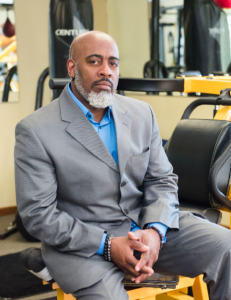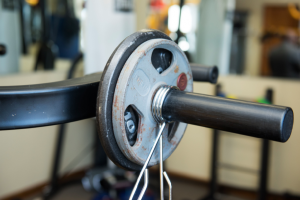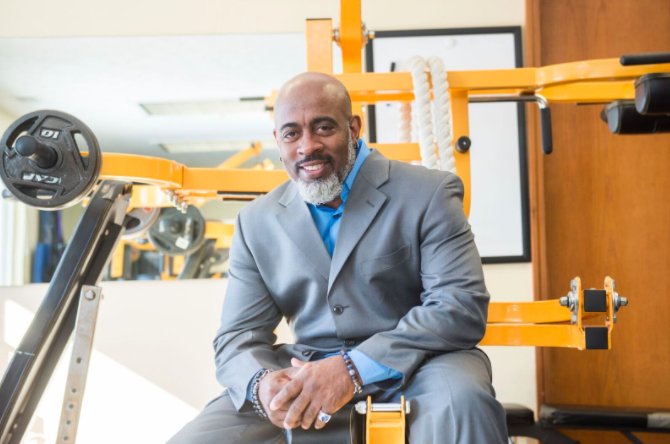Former Professional Bodybuilder, Andre Crayton, Now Trains Others to Hit Their Fitness Goals
Writer: Matt Roberts
Photographer: Amy Payne
 Carmel-based personal trainer Andre Crayton hasn’t necessarily taken the career path one might expect.
Carmel-based personal trainer Andre Crayton hasn’t necessarily taken the career path one might expect.
In 1984, he was a 114-pound distance runner who had never heard of bodybuilding. But by 1990, he was winning Indiana bodybuilding championships and competing professionally.
“I grew up in Indianapolis, but I got an athletic scholarship to Albany State University in Georgia for track and field. I was skinny,” he says with a laugh.
In the midst of the Olympic Trials in 1984, he suffered the first injury of his career when he tore a hamstring. During his recovery, he met another athlete who introduced him to bodybuilding.
“It was (devastating) at the time,” Crayton says. “I was getting a lot of recognition in Indianapolis for my running. But the injury led to rehab, and the rehab led to bodybuilding, and then bodybuilding became my profession.”
Crayton moved back to Indianapolis and decided to open his own personal training service in 1990.
“The only person who was doing it around here was Rob Hudson,” Crayton says. “He started Fitness by Design, and I met with him and asked him how to get started. So, I’ve been doing this now for more than 20 years.”
Since 1990, Crayton’s client list has included local media personalities (Patty Spitler, Joni Michaels) and athletes such as former NFL linemen Adrian Klemm and Tony Mandarich.
Crayton believes his unique approach to fitness and conditioning have helped to distinguish his service from competitors.
“What I do differently is that I don’t focus on compound multiple-muscle groups,” he says. “I show you how to isolate and train each individual muscle correctly.
“I’ve never really had to market the business. Every client I’ve ever had came to me by word of mouth. When you provide good service, people will hear about it. When you specialize in a particular technique, treat people right, and provide service with results, you don’t have to worry about marketing.”
Crayton no longer competes in professional bodybuilding, but that doesn’t mean he can let his own fitness lapse. He says that he spends an average of two hours every day working out.

“Yeah, I have to keep myself in shape,” Crayton says. “But I’m like everybody else. I slip up. I’m human. I crave junk food, and I miss workouts. I go through emotional issues just like everybody else.
“But it’s like being a bartender. You don’t bring your problems to work, and you have to be a professional.”
Since Crayton started in the personal training field, he’s seen significant changes in the industry. He maintains required certifications and can boast a decades-long track record and numerous references. But that’s not the business model for everybody.
“Anybody can take a test and say, ‘I’m now a personal trainer,’” he says. “They may have lost 30 or 40 pounds and decided to take the test, and now they’re suddenly in the business. But the test doesn’t make somebody a trainer. I tell people, ‘You get what you pay for.’ And experience is the best teacher.”
With his resume and track record, Crayton could probably more aggressively grow his operation, but that doesn’t seem to be a priority.
“I’ll be 55 in two weeks,” he says. “I’m happy. I could always use more space, but I make sure that everybody who walks through the door gets treated like family. If I died today, I’d know that I helped to change some people’s lives for the better, and that means more to me than building a bigger gym.”






